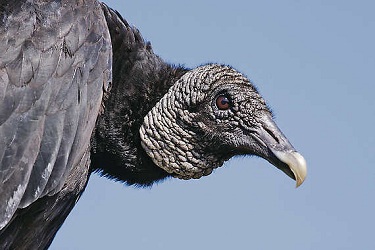
Brought to you by WBIW News and Network Indiana
Last updated on Tuesday, April 9, 2013
(BLOOMINGTON) - If you park your vehicle at Fairfax State Recreation Area on Lake Monroe for a day of boating, you may return to ripped up windshield wipers and torn window gaskets.
Dawn Hewitt of the Herald Times reports that the perpetrators are black vultures.
Indiana Department of Natural Resources staff at Lake Monroe have posted a sign at Fairfax warning visitors of the potential problem, where the big birds with featherless, black heads have damaged vehicles.
Everglades National Park in Florida has a similar problem and loans tarps and bungee cords so visitors can cover their cars in parking areas near where the birds roost.
There, an insurance company paid $1,850 for damage done to a visitor's car, according to an article in the Miami Herald.
Black vultures damaging cars is a relatively recent phenomenon at Lake Monroe. For many years, Spring Mill State Park near Mitchell was the northern edge of the black vulture range, but in 1998, the species started being spotted north of Lake Monroe. Now, they are regularly seen throughout central Indiana.
Turkey vultures, the red-headed cousin of black vultures, are more common in south-central Indiana and aren't known to damage vehicles.
Black vultures are highly aggressive and will drive turkey vultures off of carrion -- the primary food source for both species.
Both vulture species roost communally, and the "communal roost is an important focus of the social life of black vultures," according to Birds of North America Online. "It serves as a meeting place for adults and their young and as an assembly point for foraging groups. The communal roost also appears to function as an information center, a site where unsuccessful foragers can locate food by following roost mates to carcasses."
Communal roosts of black vultures are often occupied for many years, sometimes decades, according to Birds of North America Online.
DNR staff don't want Fairfax to become such a site, so they've started firing racing pistols into the air, with loud double explosions and "screamers," in an attempt to drive away roosting vultures.
"We've removed roosting trees, snags, in the area where we've had problems," said Corey Rieman, assistant property manager at Lake Monroe. "We've put up signs advising people that vultures can cause damage."
The species is protected by federal and international law, and the DNR recognizes that black vultures are part of the natural ecosystem with an important role: cleaning up dead bodies. The DNR doesn't want black vultures to leave the lake, but does want to discourage them from roosting near parking areas where they could do damage.
Rieman said he's spent hours researching why black vultures like to pick on vehicles, but came up empty.
No one really seems to know why black vultures like to tear up the soft synthetic materials on cars and trucks. Black vultures have a poor sense of smell, so it's doubtful they're responding to some scent in the plastic and rubber. They don't eat the material they've torn up, so it's not a result of hunger. Some speculate the roosting birds are simply bored as they wait for some animal to die, so they can dine.
Rieman said when black vultures perch on a vehicle, they stand their ground more than turkey vultures, and you "literally almost have to touch them" to shoo them away. That's an intimidating prospect, since vomiting is a primary defense mechanism of the roadkill-eaters.
Rieman said black vultures also roost at Paynetown State Recreation Area but haven't damaged vehicles there as they have at Fairfax, again for reasons he couldn't explain.

1340 AM WBIW welcomes comments and suggestions by calling 812.277.1340 during normal business hours or by email at comments@wbiw.com
© Ad-Venture Media, Inc. All Rights Reserved.